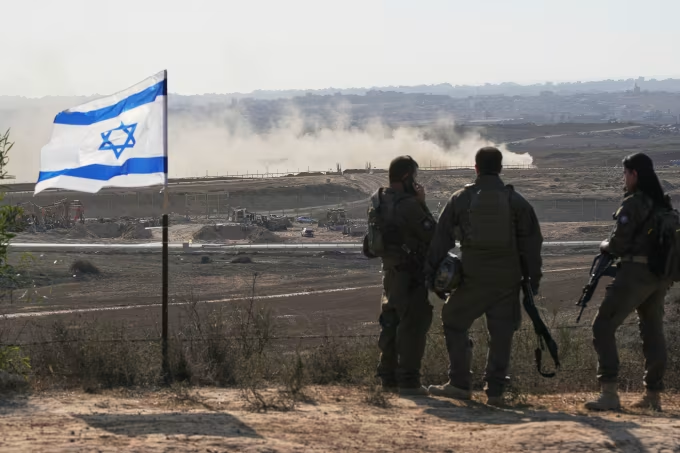Efforts to broker a ceasefire and hostage release deal in Gaza have hit a roadblock, as Israeli Prime Minister, Benjamin Netanyahu, appears focused on intensifying military operations, while Hamas insists that worsening humanitarian conditions must be addressed before it returns to the negotiating table.
On Sunday, an Israeli official stated that Netanyahu is “pushing for the freeing of the hostages through military defeat (of Hamas),” accusing the militant group of failing to participate in meaningful talks.
According to the official, the Israeli leader wants any hostage release deal tied to the delivery of humanitarian aid, specifically into non-combat zones and areas not under Hamas control.
Speaking Monday, Israeli Foreign Minister Gideon Sa’ar linked the push to widen the campaign to efforts to bring hostages home and end the war, saying it reflected “a wish to see all the hostages come back, and the wish to see the end of this war after the talks for a partial deal was not successful.”
Uncertainty remains over whether this approach aligns with U.S. President Donald Trump’s Middle East envoy, Steve Witkoff. Witkoff met with families of Israeli hostages over the weekend, spending three hours in discussions.
The Hostages and Missing Families Forum quoted him as saying, “The plan is not to expand the war but to end it. We think the negotiations should be changed to all or nothing. End the war and bring all 50 hostages home at the same time, that’s the only way.”
Witkoff reportedly continued: “We have a plan to end the war and bring everyone home.” He added, “Someone will be to blame” if the remaining hostages are not returned alive. His team did not offer clarification when asked about the envoy’s comments.
Trump stated Sunday that Witkoff is likely to visit Moscow later this week.
At least 50 hostages remain in Gaza, with Israeli estimates suggesting 20 are still alive. Over the weekend, Hamas released distressing footage of two captives, Evyatar David and Rom Braslavski, looking frail and undernourished, images that stirred outrage across Israel.
Reacting to the video, Netanyahu said it showed Hamas had no intention of reaching a deal, “They want to break us with these horrifying videos, with the false horror propaganda they’re spreading around the world.”
However, the Hostages and Missing Families Forum warned against renewed military escalation, accusing Netanyahu of misleading the public.
“Netanyahu is preparing the greatest deception of all. The repeated claims of freeing hostages through military victory are a lie and a public fraud,” the forum stated.
They urged both sides to agree on bringing “the 50 hostages home, ending the war, and then rebuilding and reviving Israel.”
Hamas has reiterated its commitment to negotiations but insists that talks can only resume once humanitarian issues are addressed. “The catastrophic humanitarian situation” must come first, said Basem Naim, a senior Hamas political official.
Another Hamas figure, Mahmoud Mardawi, told CNN there was “no point” in pursuing dialogue while Gaza’s population faces extreme hunger.
The humanitarian toll continues to escalate. According to the World Health Organization, hunger-related deaths in Gaza spiked in July.
More than 5,000 children under five were treated for malnutrition in the first half of the month alone.
On Monday, Gaza’s Hamas-run Government Media Office said 600 aid trucks were needed daily to meet basic needs, but only an average of 84 had entered over the past week. COGAT, the Israeli agency managing aid deliveries, said more than 200 trucks were distributed by international organizations on Sunday.
Despite this, looting, by desperate civilians or organized groups, remains a persistent issue, further complicating distribution efforts.
The United Nations reported on Friday that nearly 1,400 people have died seeking food since late May, including 859 near sites run by the U.S.-backed Gaza Humanitarian Foundation and 514 along food convoy routes.
“Most of the killings were committed by the Israeli military,” the UN said. On Sunday alone, 30 people were killed while attempting to access food, 19 in northern Gaza and 11 near a GHF site in Rafah, according to the Palestinian Health Ministry.
Public sentiment in Israel appears divided. A recent poll by the Institute for National Security Studies found that 38% of Israeli Jews believe disarming Hamas is unachievable, while 57% think it can be done.
Meanwhile, hundreds of retired Israeli security officials have issued a plea for international intervention.
In a letter addressed to Trump on Monday, they urged him to pressure Netanyahu to end the war.
“It is our professional judgement that Hamas no longer poses a strategic threat to Israel,” the letter reads. Ami Ayalon, former head of the Shin Bet security service, added: “At first this war was a just war, a defensive war, but when we achieved all military objectives, this war ceased to be a just war.”
Still, far-right elements within Netanyahu’s government are advocating for the occupation of parts of Gaza and policies to drive its residents out permanently, positions that could further complicate already-stalled negotiations.
